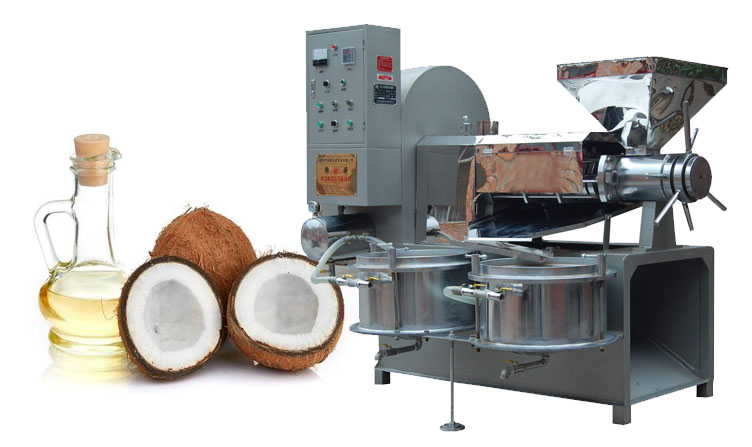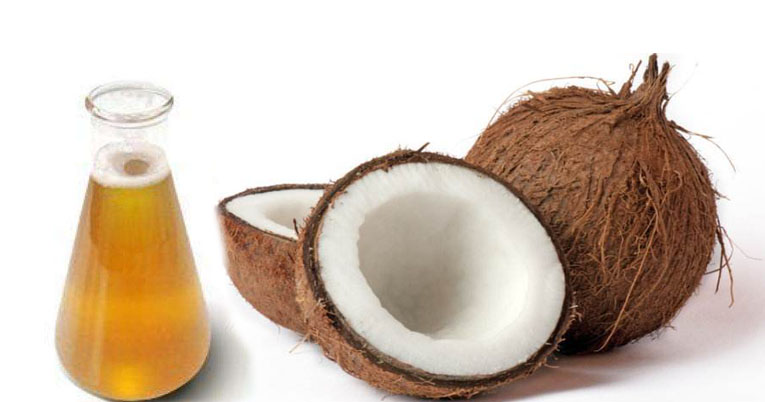What is the method of extraction of coconut oil?
Coconut oil extraction has been a traditional practice for thousands of years, with various methods used to obtain high-quality oil. One common method involves boiling the coconut meat in water and skimming off the oil that floats to the surface. Another method is to extract coconut milk from the meat and let it ferment for a day or two, allowing the oil to separate from the water.
Modern coconut oil extraction method:
In modern times, there are various methods for coconut oil extraction, each with its own unique advantages and disadvantages.
1. Dry processing:

Copra is used as raw materials and extracted from crusher or screw coconut oil machine. Solvent is then used for secondary extraction to obtain residual oil in the meal.
Coconut oil processing technology
Copra – automatic balance – magnet – grinding machine – cooking and conditioning device – screw coconut oil extraction machine – depositing tank – filter machine – crude coconut oil
Efficient operation of a coconut oil machine requires cooking and conditioning to control the temperature of coconut flakes between 91-93°C. The oil extraction rate of coconut flakes is lower when the temperature is below 91°C and the moisture content is above 4%. Conversely, when the temperature is above 93°C and the water content is less than 3%, dark coconut oil and coke cake may be extracted from the flakes, resulting in a lower oil extraction rate.
During later pressing processing, the coconut oil obtained from the machine is conveyed to a screen and an oil clarifying tank to separate particles. The particles are then mixed with raw materials for reprocessing. Every ton of upper oil is mixed with 10kg of clay, and edible oil can be obtained through a security filter machine. Coconut oil meal can be stored or further processed and filtered before being sent to an animal feed factory through granulation and bagging.
2. Wet processing
In the process of wet processing, fresh coconut meat is used as the raw material. In addition to the product oil, other edible by-products from coconut oil are coconut powder, protein, carbohydrates and vitamins.
Shell the ripe coconut and separate the coconut meat. Then, peel off the out coat and extract coat oil from it as a by-product. Coconut meat would be ground by the wedge and toothed crusher and roller mill. Then, coconut milk would be extracted from crushed powder and filtered through the sieve mesh conveyor, then separate out the oil layer by centrifugal separation, and the moisture in the oil is reduced to 0.1%-0.2% by air heating. Generally speaking, you can extract 6.8t “natural” coconut oil from 25t fresh coconut meat. Grind the coat residues from coconut oil extraction machine to powder to recover the oil and make coconut powder.
3. Solvent extraction
This unit is used as a supplement to the mechanical pressing method. After the quick extraction of coconut cake, the residual oil content is controlled at 14%-18%, and the residual oil in the cake is reduced to a minimum after solvent extraction.
4. Refining
The refinement of coconut oil consists of a series of steps to remove the impurity from glycerin and make the product edible and extend its shelf life. Impurities are fatty acids, phospholipids, metal ions, pigments, oxides, solid particles and unpleasant volatile gases.

The difference between cold pressed coconut oil and refined coconut oil
Cold pressed coconut oil is made from fresh coconut. The liquid of this oil is clear as water and it is white after curing. The oil retains its original ingredients and has a special smell and taste of coconut without using high temperature and chemical treatment.
Refined coconut oil is mostly made from copra and it is widely used in the food industry. Because of its colorless and tasteless, many people also like to eat it.
Coconut oil extraction is a time-honored practice with a range of methods available to suit different needs. Whether for culinary or cosmetic purposes, coconut oil is a versatile and valuable product with a long history of use. As with any product, it is important to carefully consider the method of extraction and the desired end product to ensure the best possible results.

